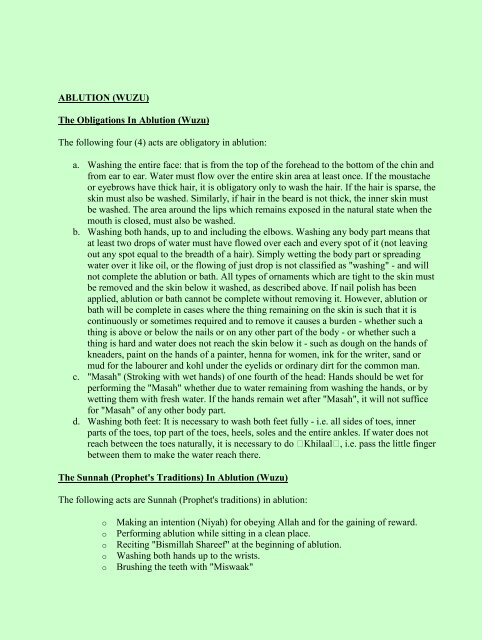The Book Of Prayer (Kitaab-ul-Salaat)
The Book Of Prayer (Kitaab-ul-Salaat)
The Book Of Prayer (Kitaab-ul-Salaat)
Create successful ePaper yourself
Turn your PDF publications into a flip-book with our unique Google optimized e-Paper software.
ABLUTION (WUZU)<br />
<strong>The</strong> Obligations In Ablution (Wuzu)<br />
<strong>The</strong> following four (4) acts are obligatory in ablution:<br />
a. Washing the entire face: that is from the top of the forehead to the bottom of the chin and<br />
from ear to ear. Water must flow over the entire skin area at least once. If the moustache<br />
or eyebrows have thick hair, it is obligatory only to wash the hair. If the hair is sparse, the<br />
skin must also be washed. Similarly, if hair in the beard is not thick, the inner skin must<br />
be washed. <strong>The</strong> area around the lips which remains exposed in the natural state when the<br />
mouth is closed, must also be washed.<br />
b. Washing both hands, up to and including the elbows. Washing any body part means that<br />
at least two drops of water must have flowed over each and every spot of it (not leaving<br />
out any spot equal to the breadth of a hair). Simply wetting the body part or spreading<br />
water over it like oil, or the flowing of just drop is not classified as "washing" - and will<br />
not complete the ablution or bath. All types of ornaments which are tight to the skin must<br />
be removed and the skin below it washed, as described above. If nail polish has been<br />
applied, ablution or bath cannot be complete without removing it. However, ablution or<br />
bath will be complete in cases where the thing remaining on the skin is such that it is<br />
continuously or sometimes required and to remove it causes a burden - whether such a<br />
thing is above or below the nails or on any other part of the body - or whether such a<br />
thing is hard and water does not reach the skin below it - such as dough on the hands of<br />
kneaders, paint on the hands of a painter, henna for women, ink for the writer, sand or<br />
mud for the labourer and kohl under the eyelids or ordinary dirt for the common man.<br />
c. "Masah" (Stroking with wet hands) of one fourth of the head: Hands sho<strong>ul</strong>d be wet for<br />
performing the "Masah" whether due to water remaining from washing the hands, or by<br />
wetting them with fresh water. If the hands remain wet after "Masah", it will not suffice<br />
for "Masah" of any other body part.<br />
d. Washing both feet: It is necessary to wash both feet f<strong>ul</strong>ly - i.e. all sides of toes, inner<br />
parts of the toes, top part of the toes, heels, soles and the entire ankles. If water does not<br />
reach between the toes naturally, it is necessary to do “ Khilaal” , i.e. pass the little finger<br />
between them to make the water reach there.<br />
<strong>The</strong> Sunnah (Prophet's Traditions) In Ablution (Wuzu)<br />
<strong>The</strong> following acts are Sunnah (Prophet's traditions) in ablution:<br />
o Making an intention (Niyah) for obeying Allah and for the gaining of reward.<br />
o Performing ablution while sitting in a clean place.<br />
o Reciting "Bismillah Shareef" at the beginning of ablution.<br />
o Washing both hands up to the wrists.<br />
o Brushing the teeth with "Miswaak"





